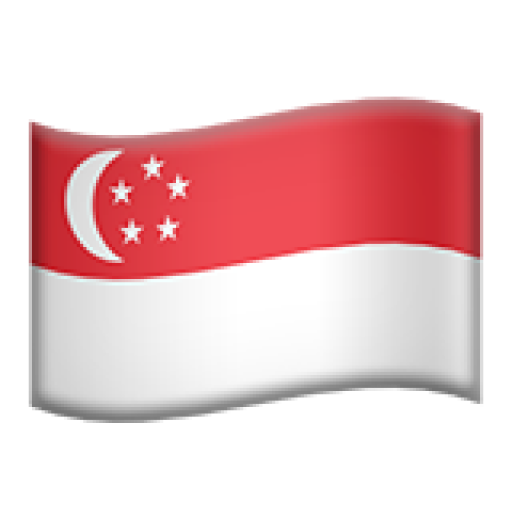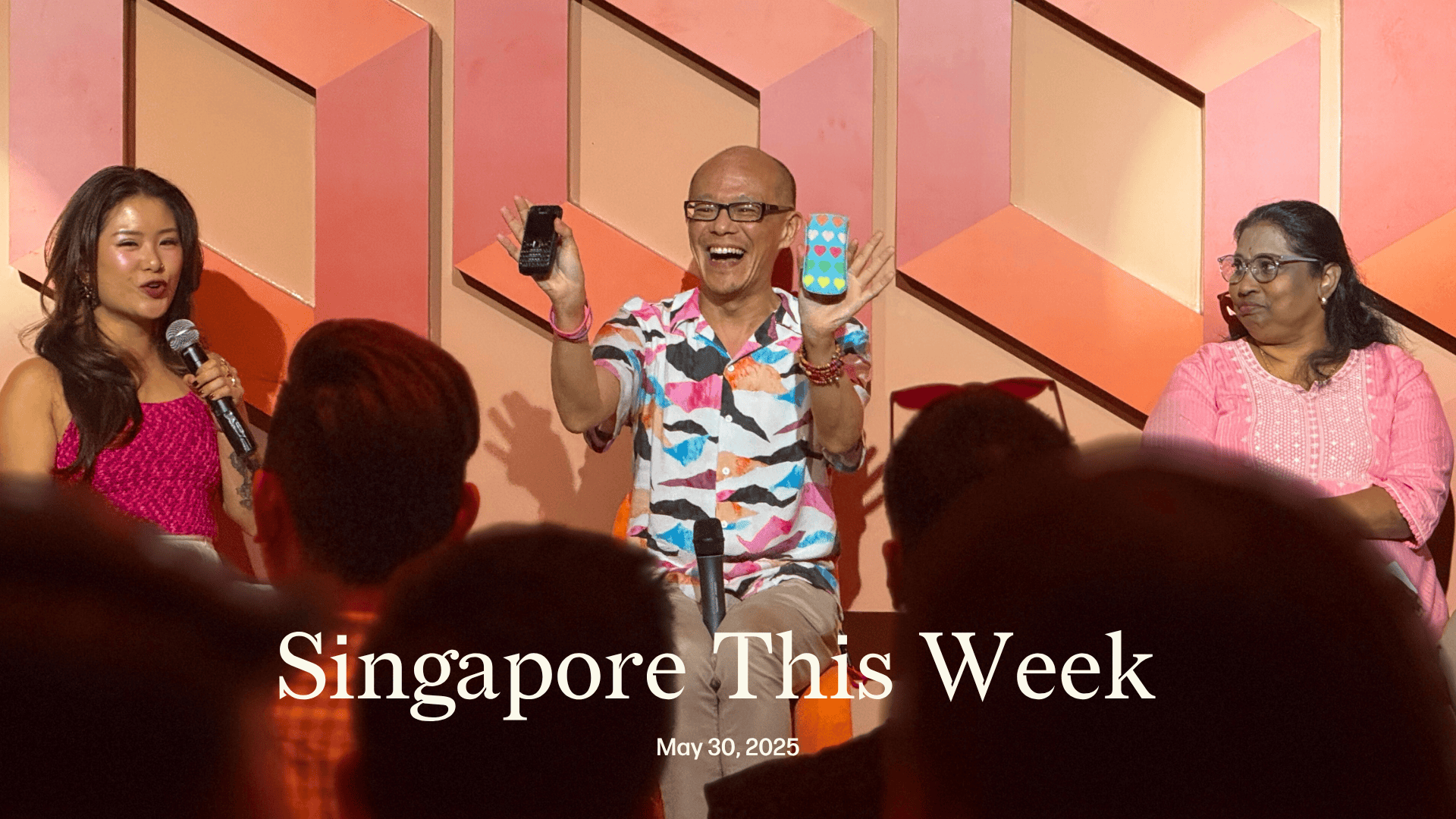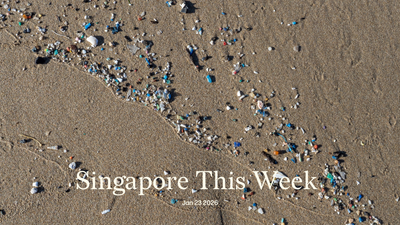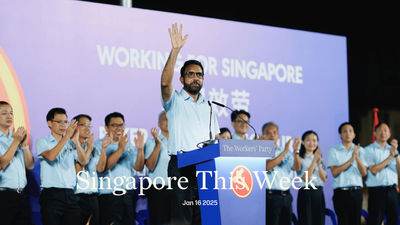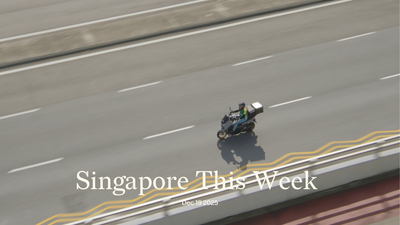Politics: Hanging Halimah out to dry
In early May, following two months of aid blockades to Gaza, and with one in five people facing starvation, Israel began its latest offensive in its war on Gaza. Bezalel Smotrich, Israel’s foreign minister, said that “Gaza will be entirely destroyed”, and that its Palestinian population will “leave in great numbers to third countries”. With over 50,000 Gazans already killed, fresh allusions to ethnic cleansing have sparked global revulsion. A joint statement from the leaders of Canada, France and the UK said that the “level of human suffering in Gaza is intolerable” and that it may be breaching international humanitarian law. The clearest sign of the tide turning was that last week, Piers Morgan, a TV show host who hitherto had been an apologist for Israeli retribution, said that he finally agrees with Mehdi Hasan, a critic, about what Israel is actually doing, including “genocidal language” amidst the “starvation of people”.
But in Singapore? Barely a whimper. On May 20th, a day after the aforementioned joint statement from Western leaders, a Ministry of Foreign Affairs “spokesperson” issued a tepid rehash of Singapore’s stated positions on the issue. Their statement reflected deep thought and empathy; ours could have been written by ChatGPT. On May 23rd, Halimah Yacob, a former member of Parliament (MP) with the ruling People’s Action Party (PAP) and former president, said that keeping quiet about the “humanitarian catastrophe” makes us “complicit in the violations of international humanitarian laws and encourages similar aggressions elsewhere.”
Cue the backlash. Critical Spectator, the nom de guerre of Michael Petraeus, a Polish visitor to Singapore and PAP fanboy, attacked Halimah, which in turn drew a rebuttal from Faishal Ibrahim, acting minister in charge of Muslim affairs. Irene Ng Berry, a former PAP MP, issued a thinly-veiled criticism of her former colleague, effectively saying that four of Singapore’s “great presidents”, all Halimah’s predecessors, understood their roles. “Nobody expected them to speak up for their religious or racial groups, or to make public appeals on behalf of any group on external conflicts whatever the circumstances.”
Ng has demeaned Singapore’s first female and first elected Muslim president. Why must Halimah adhere to some imagined diplomatic playbook from our past? Many Singaporeans are eager to interrogate our historical relationship with Israel, and are looking for leaders who can voice our concerns. If anything, she’s demonstrated a moral certitude often sorely lacking. It’s perhaps time Halimah interrogated her own relationship to the party. In 2017, it instrumentalised her race in order to elevate her to the presidency, partly to keep out its nemesis, Tan Cheng Bock. In 2023, she could have run for a second term as the party’s choice, but was possibly dissuaded from doing so because leaders didn’t trust her to win an open election. And now, she’s again being put in her place. Do exactly as you’re told, Madam Halimah, seems to be the message.
Some further reading: In “Genocide in Gaza? Our moral responsibility”, Jom examines the history of that loaded term, its applicability today, and also explores Singapore’s historical ties to Israel.
Politics: Ketchup Bros swoon over Bilahari
Like elsewhere, podcasters have proliferated as an important alternate source of political commentary and information in Singapore. At one level, we should cheer this diversity. But at another, we must be skeptical when guests are allowed to regurgitate their biased views on contentious topics without pushback. Bilahari Kausikan, former diplomat, used his recent appearance on “The Daily Ketchup” to do just that with Israel’s war on Gaza. The show’s hosts allowed him to chart a history of the conflict that begins in 1947—a convenient starting point for Zionists. A fairer and more robust view would begin with the 1917 Balfour Declaration, issued by British colonialists in support of the Zionist Federation and without proper Arab involvement, a farce that the writer Arthur Koestler described as: “one nation solemnly promised to a second nation the country of a third.” Kausikan’s selective reading of history and the conflict have been questioned by K Shanmugam, home affairs minister, Jom, and many others. Surely “The Daily Ketchup” hosts could have pushed him?
Perhaps worse, they allowed him to frame his realpolitik vision of international affairs as the only one worth considering. Kausikan narrated an anecdote about a Singaporean suggesting we cut ties with Israel. “If I was the dictator of Singapore, I will cut ties with Israel like that. Tomorrow. If you can tell me that the Israelis will stop doing what they’re doing. Will they? Is it going to make any difference? So we will cut off our nose, because we do have interests with Israel, not just military interests, other things. So what for? This is what I call mistaking feeling good for actually doing good.”
Kausikan is wrong. Israelis have called our countries’ relationship a love affair; and the PAP regularly brags about our outsized influence in the world. Surely Singapore cutting ties, at least militarily, with Israel and further isolating it will have some medium- to long-term impact, even if not an immediate cessation of hostilities. We must start somewhere. Moreover, many Singaporeans are tired of viewing our external relationships in purely pragmatic, transactional terms. Moral considerations are increasingly important. We’re interrogating our relationship with Israel not just because we want to stop its war on Gaza; but because, as Halimah said, we don’t want to be complicit, to have the blood of innocent children, men and women on our hands. To act morally, Kausikan fails to see, is in fact to do good.
Society: Crushing rents are too damn high
Across Singapore, the disquieting sound of shuttering businesses and the deafening silence of empty storefronts, the consequence of high-rent blight. “...[S]mall businesses like mine are being priced out of our own country,” one owner lamented, having seen their monthly rent rise by over 50 percent since 2018 to more than S$20,000, accounting for 30 percent of overheads. One of the latest, and loudest, casualties is Flor Patisserie, a popular Japanese-inspired bakery, who announced that it would close by July. Having been in business for 16 years and survived many challenges, including a manpower crisis and soaring food costs, the last straw was a 57 percent rental increase at its last-remaining outlet on Siglap Drive in the east. While their previous landlord only increased their rent by S$500 over 10 years, the new owner “immediately” raised it by 20 percent to S$5,400 when it bought the unit in 2022, and is now asking for S$8,500 a month. “[R]ent is one thing that kills you know?” bemoaned the bakery in an IG post. “We are not asking for handouts or preferential treatment. We want our government to introduce policies to create a fair playing ground for businesses and landlords…[who] hold overwhelming negotiating power.”
Policy ideas include vacancy or property taxes to discourage leaving real estate vacant; targeted rental relief from the state; cooling measures like clamping down on foreign ownership of commercial and retail property; and rent control. The latter, though, can have a detrimental effect on market forces and lead to declining investment in property management and development. Writing to The Straits Times, Keith Wong suggested rent-to-revenue leasing, a model that’s used in Australia and the US and “fosters a more equitable risk-sharing dynamic”. Wong also highlighted the pop-up-to-permanent lease model that saw success in London’s Boxpark Shoreditch; and community equity leases, “where landlords hold small stakes in tenant businesses.”
Many landlords here would rather hold out for higher rents, preferring to pass up on revenue in the short term than commit to a lower long-term lease, which may decrease the property’s value. Is it any wonder that they’ve been called “predatory”, “parasitic” and “greedy”. More than its impact on the entrepreneurial ecosystem, unaffordable rents threaten community identities and heartland business cultures, necessarily shaped by a diverse landscape of neighbourhood businesses, and not just the monopolisation and monotony of larger chains and franchises with higher capital.
Society: “Our love letter to the future”
Organisers of this year’s Pink Dot (June 28th) are calling on people to help fill a community time capsule with objects that, to their donors, signify love in any of its myriad meanings. At its launch event, Leow Yangfa, executive director at Oogachaga, a social support group for the LGBTQ+ community since 1999, waved the ancient Blackberry that served as one of Oogachaga’s hotlines, before the group had a physical office. “[T]his phone for a lot of people meant a connection…to a volunteer who would listen to whatever was troubling them. Whether it was somebody who’d broken up with their girlfriend and she couldn’t tell anyone else, or a young gay man who’d just come from a clinic [where] he’d been told he’s got HIV, or maybe a trans person who was just figuring out what was going on, couldn’t access hormones or maybe just had a fight with their family.” The phone’s hearts-speckled cover will go into the time capsule.
June and Alicia Chua, two transwomen, co-founded The T Project, the country’s only shelter for homeless trans people, in 2014. June recalled attending Taiwan Pride with Alicia that year, wearing bright green and blue versions of the same jersey. Alicia passed in 2015; her jersey will go into the time capsule. “This year we’ll bring our team to go and attend Taiwan Pride… to relive my memories [with my sister],” she said to a chorus of awwws from the crowd. “Of all things I miss about her, it’s the quarrels eh, because I always win one mah. [But] after her death, our relationship improve because we never quarrel already.” Cue hoots of laughter.
Kishan, a teacher and one of the evening’s emcees, recalled being outed at a Ministry of Education (MOE) school and accused of “promoting a homosexual lifestyle” among students. “Who got time?! You ask any teacher.” The ministry questioned him, and said they’d have to do it again even if another “baseless complaint” was made. Kishan quit for a private school. Last week, he and his students took a photo of their hands painted in pride colours; that, alongside the warning letter issued by Kishan’s old employer, will be part of the capsule. Once sealed, the capsule will be opened in 2050, “when the new generation of LGBTQ+ Singaporeans will be coming into their own. We want them to be able to open the time capsule and see stories of love that reflect back at them,” said Clement Tan, spokesperson. “This is our love letter to the future.”
Some further reading: In “The repeal of S377A: democracy, secularism, and acceptable speech under threat”, we consider the usurping of democratic norms, the infiltration of religion into the politics of a secular state, and the ignorance of the bounds of free speech.
Society: The long roadmap to success
An “intense focus on academic achievement from a young age adversely affects children’s self-esteem, mental health, holistic development and future resilience,” wrote Pooja Bhandari in a recent essay for Jom. Bhandari is the founder of EveryChild.sg, an NGO calling for comprehensive primary education reform to reduce systemic stress, improve outcomes, and prepare Singapore’s children for the 21st century’s fresh challenges. In 2022, the EveryChild team released an excellent policy white paper that called for smaller class sizes, making PSLE optional, and assessing young children more holistically (and kindly), among a host of other proposals.
Now, the group has released a roadmap to help authorities do just that. Among its suggestions: switching the entire 2031 primary one cohort to a more well-rounded system like International Baccalaureate’s Primary Years Programme; making PSLE optional for all students by 2032; capping all class sizes to 25 and below by 2036 while tapping on tutors, former MOE staff, and new hires to recruit 9,000 more teachers to meet the increased demand. EveryChild also wants primary school allocation that does away with alumni advantages, and removes incentives for donations and volunteering that disproportionately benefit richer parents.
“We wanted to take the conversation out of the abstract,” said Bhandari. “We’re not just saying, ‘Let’s just reduce class sizes.’ We’re saying: ‘Here’s how you do it, here’s what it would cost, and here’s what we could gain in return.’” The policies and the roadmap emerged from EveryChild’s engagement with the public through town halls, online campaigns, as well as roundtables involving parents. Now, the group will share it with MPs, policymakers and other stakeholders.
The roadmap is yet another step in EveryChild’s indefatigable efforts to transform a system patently unsuited for this age. But, as Bhandari wrote in Jom: “MOE has…developed an internal culture of blaming the behaviour of parents for perpetuating stress and competition, without seriously examining policy solutions that go beyond minor tweaks.” In this culture, is such a sea-change plausible? If our education overlords don’t want to learn, it doesn’t matter how good the lesson is.
History Weekly by Faris Joraimi
There once was a seashell museum on Jalan Loyang Besar, in my hometown of Pasir Ris. It was called Dari Laut, “From the Sea”. Opened by Goh Keng Swee, then-finance minister, in 1969, it was only accessible to American soldiers on rest and recreation from Vietnam, until the war ended. Our island-city had other attempts to display ocean life, all with more prosaic names: the Van Kleef Aquarium, Underwater World, the Coralarium at Sentosa. All closed down, and none rival our grandest one yet. The “S.E.A. Aquarium” at Resorts World Sentosa (RWS)—until 2014, the world’s largest—will be expanded and re-christened the “Singapore Oceanarium”. It opens on July 23rd, after a three-month renovation. This upgrade promises more than mere rebranding. For one, the new name asserts a serious commitment to public science. “S. E. A.” was a marketing gimmick, a pun suggesting regional importance, even though South-east Asian habitats were never the main focus of their exhibits. Spokespersons announced that the new Oceanarium will be a “world-class ocean institute”, with a dedicated learning centre partnering with universities for conservation, education and marine research programs. Tan Hee Teck, the CEO of RWS even said they’re building “not just a destination, but a catalyst for change, a place where curiosity transforms into knowledge, and knowledge into real action.” Bright and beautiful words indeed. In its early years the Aquarium attracted controversy from its capture of wild Indo-Pacific bottlenose dolphins, four of which later died. Yet it remains accredited by the Association of Zoos and Aquariums, an authority in global best practices for animal welfare, husbandry, operations, and veterinary care.
It’s still widely debated whether such attractions really cultivate conservation-minded, ethical societies. Despite their educational mission statements, these are profit-driven attractions, serving entertainment to paying guests. How deep are their relationships with civil society organisations pushing for ecological protection and climate reform? How activist should research institutes be? Do visitors even want to be educated? Bigger and better displays, please; less marine biology! This tension is as old as the invention of the aquarium itself in the 19th century. When Philip Henry Gosse popularised the glass tank in Victorian England, a craze for collecting live fish, coral, seaweed and anemones decimated local shores. What is the cost of wonder? To be fair the S. E. A. Aquarium taught us about coral-bleaching, microplastics, and how the boiling seas affect us. Gone are the days of dolphins performing stunts for gawking humans at Underwater World, one of the S. E. A. Aquarium’s predecessors. The Oceanarium will also have a “Singapore Coasts” exhibit, dedicated to the biodiversity of our own shores. Or rather, what’s left after land-reclamation, oil spills, and mangrove deforestation. Singapore’s waters today are a far cry from the coral reef-paradise described by colonial naturalists. Surely, this “world-class ocean institute” won’t filter out those murky topics, will it?
Arts: Sing a song of Singapore
Here it is: “Here We Are”, this year’s National Day Parade (NDP) theme song.
You know the recipe:
“Our differences will make us whole.”
One meticulously multicultural friend group in a spotless HDB void deck, featuring a faultless ball toss and an artfully angled skateboard.
“No matter the weather, through the storms and changes, wave your flag in the sun.”
A dash of working class craftsmen and sweaty athletes, working hard.
“As we face the unknown, just know you’re never on your own.”
Topped off by a brown woman, brow furrowed, sitting alone at a sewing machine in a darkened studio, under a single, dramatic spotlight, who...eventually launches a social enterprise?
All our multiracial and meritocratic tropes are here, and SG60 has raised the carat count for our Diamond Jubilee. We’ve got Charlie Lim, with his dulcet tenor and achy falsetto, returning to his indie folk roots and the plaintive flourishes of the piano. We’ve got Kit Chan, the face and voice of “Home” herself, the song precision-engineered to summon wayward Singaporeans back, well, home. In the music video, the duo are sheathed, respectively, in a dark crimson shacket and a deep maroon blazer—one symbolic shade to the left of red. Behind them, the velvet curtains of what looks like a school hall.
On the floor, they’re circled by enthusiastic members of the vocal ensemble The Island Voices. “Here we are!” they belt. “Through the fire! We can live our hopes and dreams!” They’re channelling the choreographed spontaneity of the recent community choir movement in Singapore, popularised by the Sing Song Social Club. The monthly gathering boasts a bankable lineup of musicians and singer-songwriters, many of whom also happen to be NDP alumni: Benjamin Kheng, Nathan Hartono and Sandra Riley Tang. Strangers getting together and singing their hearts out, while rubbing shoulders with familiar local stars—the NDP theme song tends to be surgically on-trend that way, with its pastiche of contemporary genres and promise of a national platform for homegrown talent.
Lily Kong, geographer, has described the parade as one of the state’s many tools of cultural hegemony, that signature blend of military might leavened by the creative soft touch. The parade’s basic formula has hardly varied over the past two decades, not unlike the comforting familiarity of mass, or other public rituals of worship. There have been changes to components one might describe as modular, or minor, but its structure has retained a longevity we hardly see in other aspects of the nation-state. Love it or hate it, our annual patriotic earworm is certainly the worship pop hit of our state’s civil religion.
Some further reading: In “A National Day baby reviews ‘National Day Charade’”, Jom’s arts editor hops on board the nostalgia train of the National Day Parade, and why its synonymous songs and prefab format get us every time.
Arts: Paint the town red
The green-and-yellow People’s Park Complex, that 31-floor modernist monolith looming over Chinatown, is getting a red-and-white makeover. Just in time for National Day? Not quite. Its managing agent told ST that “the colour scheme was not specially chosen to mark SG60”. But that fire hydrant red is both unmistakeable—and polarising, according to Darren Soh, one of Singapore’s most prolific architectural photographers. “You either love it or you don’t,” he told ST. Soh, who’s been documenting the building, including its repainting works, for years, added: “Everything and everyone around People’s Park Complex will now have a red hue when light is shining brightly on its facade.” The complex got its last coat of paint in 2009, and was due for a paint job after the Building and Construction Authority instructed its management at the end of last year to do a facade inspection and rectify defects. Koh Seow Chuan, one of the architects behind the brutalist behemoth, noted that the building was previously unpainted. “Fair-faced concrete was in vogue after the war when most countries were poor,” he said.
The complex’s new coat was, at least, “recommended by a designer and approved by the building’s management council”, unlike several housing board blocks in Tiong Bahru that were recently slathered in every shade of purple from lilac to ultraviolet. Residents, fresh off the back of the General Election, were dismayed that they hadn’t had any say in this decision. In the cry over a hue, home-made signs of complaint, pasted at the lift lobbies of affected blocks, became the site of a lively debate between pro- and anti-purple parties. “Dear Residents,” the call to action read, “Our block of flats is about to be painted in the most saturated and awful Purple.” A chorus of residents then scrawled in the margins: “No purple!!”; “Double Yes For Purple” (accompanied by two red check marks); “Deep Yes Purple”; “I like the colour”, which was promptly followed by “Are you Colourblind?” and “R U the contractor?” Foo Cexiang, newly elected MP for Tanjong Pagar GRC, had to put his own signs up to reassure his colour-coordinating constituents that he was “looking into this urgently”. Two weeks ago, Foo said that residents will vote on the matter. One of them, who called the darker purple shade an “eyesore”, affirmed the right to aesthetic agency: “We should be allowed to vote on the colour – even if not everyone is satisfied, at least it’s a majority vote.” Singaporeans, disenfranchised from national decisions on issues like GST, Gaza, and queer rights, at least get to choose their own colours.
Tech: MERaLiON, the multicultural AI model
A localised large language model (LLM) is necessary to bring Singapore’s numerous languages and dialects within AI’s ambit. MERaLiON, a multimodal model by A*Star Institute, is a major advancement in regionally adapted artificial intelligence. Announced at the Asia Tech x Singapore conference, MERaLiON can understand and communicate in at least eight regional languages, including English, Mandarin, Tamil, Malay, Thai, and Singlish.
Unlike Western-trained AI models, MERaLiON is attuned to local linguistic nuances, code-switching, and emotional cues such as tone and volume. This could make it a valuable tool in eldercare and scam prevention, where understanding context and emotion is critical. It can autonomously call seniors to check on their well-being, detect emotional distress, and generate case summaries for social workers. MERaLiON is also being tested for use in screening scam calls. The AI model’s open-source availability and its integration into a S$70m national initiative highlight Singapore’s commitment to AI innovation. The establishment of the MERaLiON Consortium, whose members include Microsoft Singapore, the Ministry of Health’s Office for Healthcare Transformation and SPH Media, is a welcome push toward AI systems that reflect regional identities and societal needs.
Tech: Will BYD be omnipresent in South-east Asia?
Chinese EV leader BYD is preparing to export its “God’s Eye” intelligent driving system to Singapore. This marks a shift from electrification to smart technology as the next battleground in the auto industry. The phased rollout, beginning with basic features like automated parking and adaptive cruise control by 2025, reflects BYD’s cautious approach to navigating diverse road conditions and evolving global regulations. While the technology is already standard in most BYD models in China, its overseas deployment faces unique challenges.
BYD has unparalleled scale, with over 4m vehicles sold globally in 2024. (For comparison: Tesla sold 1.78 m.) This gives it a critical advantage in data collection to refine its algorithms. However, consumer skepticism about safety, especially over battery fires and varying international data privacy laws could slow adoption. Further, in the wider South-east Asian region beyond Singapore, infrastructure readiness and regulatory frameworks for assisted driving remain uncertain. BYD’s strategy underscores China’s broader push to export high-tech automotive solutions amid global trade tensions, but success hinges on adapting to local norms. As the company tests systems on Singaporean roads, its ability to balance innovation with compliance will determine whether “God’s Eye” becomes a global standard or faces region-specific limitations.
Correction notice: An earlier version stated that Kishan and the students painted their nails, and that Kishan was questioned by the school.
If you enjoy Jom’s work, do get a paid subscription today to support independent journalism in Singapore.

